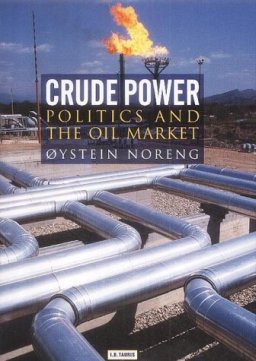Oystein Noreng
London: I. B. Tauris, 2002,
Noreng is Total Fina Elf Professor of petroleum economics and management at the Norwegian School of Management and an experienced advisor and consultant within the industry. Having worked in the oil industry for fifteen years and in the Middle East for the past seven, I was pleased to find Noreng accurate and politically neutral in his excellent analysis of the subject.
The book was written post 9-11 but pre Gulf War II and is divided into five chapters: ‘The Necessity of Oil’; ‘Foreign Powers and Middle Eastern Oil’; ‘Oil Supplies, OPEC Oligopoly and Politics’; ‘The Political Economy of Oil Prices’; and ‘The Persistent Political Risks’. Oystein states:
‘The aim of this book is to analyse the world’s persistent dependence on Middle Eastern oil and why oil prices cannot stabilise at any level.’
The book explains how oil is not a ‘normal’ commodity. It is both a curse and a blessing to the oil producers and is not driven by normal rules of supply and demand. If it were a fluid it would be a non-Newtonian fluid as there is neither ‘logic’ nor predictability to pricing and supply and demand. I had no idea that the oil shortage in 1973 which raised prices hugely was balanced very early on and in fact the oil supply increased notably in a short time. The decision to hold the price high was not one from which OPEC necessarily benefited.
Any government claim that high taxes on oil are there to protect the environment is also shown to be untrue. He writes:
‘When European motorists fill their tanks, they essentially pay tax….. Remarkably, motor fuel taxation in Europe and Japan and many other countries over time is not symmetric, meaning the government intention evidently is to tax, not to discourage use or safeguard trade balances.’
Oil is the number one political commodity in the world. If prices rise too high the consumer society slows down and eventually the producer suffers. As the producer economies are facing serious demographic problems they are hardly likely to cut supplies as this would cause hardship in the short term and revolution in the medium term.
I wondered if he foresaw the 2003 war on Iraq. He writes:
‘As the United States has not managed to unseat Saddam Hussein, it is left with the uncomfortable choice of accepting the Iraqi regime or overthrowing it by force, meaning invasion and occupation, with a high political risk that makes this option scarcely realistic.’
He obviously had not read the Program for the New American Century!
The history of the Middle East from the 1900s is about oil and war, alliances, empire and exploitation of the Arabs and Persians by British, French, Russian and American interests; and by their own capricious rulers. However the future of the Middle East now is wholly unpredictable – except that there shall be wars.
He avoids detailed examination of the cultural abyss between Middle East producers and western consumers but lays down serious and sensible answers as to how we got to where we are in the present Middle Eastern geopolitics. Let me quote him and hope serious students will take up the book; for knowledge of his depth will help the debate rise above name-calling and simplistic solutions.
‘The West is a victim of its own trap in the Middle East. By supporting corrupt and dictatorial regimes for immediate economic and strategic advantages, the West has prevented necessary change to stabilise the countries concerned through representative government.’
He cites deteriorating relations with Saudi Arabia and notes some US voices which favoured attacking Iraq.
‘The motive would be not only to eliminate a military threat but also to open Iraq for US oil investors…….The 1990-91 Gulf conflict was over oil, not democracy in Kuwait.’
He shows, however, that the argument put forward by some that oil wars are simply for the convenience of American consumers at the pump is simplistic.
He highlights the futility of predicting the oil futures market:
‘In March 1999, prominent observers remarked that oil prices were likely to stabilize around five dollars a barrel and stay there for a long time. Within a week OPEC, supported by Mexico, Norway, and Oman, reached an agreement that reduced oil supplies and sent prices soaring…. above thirty dollars/barrel over the next two years……Oil market stability will require either the replacement of the Iraqi regime ……Or Iraq dominating the Gulf.’
Unlike others he does not see supplies dwindling terribly quickly and dismisses worries over resource depletion.
He provides a lot of information and, despite being occasionally repetitive and sometimes difficult to read (it doesn’t always flow and at times appears to be sequential collated facts, all true but not connected) this book is highly recommended for anyone who wishes to understand the relationship between oil suppliers, consumers and governments.
